This guest post from Christine Hughey is part of the feature at Get Rich Slowly. Some stories contain general advice; others are examples of how a GRS reader achieved financial success — or failure. These stories feature folks from all .
I met Christine in January when I attended in Florida. Christine is starting a new company, so when I spent a week there in April, naturally I let her show me around. It was awesome! In this article, she shares how small acts of kindness have proven to be worth more than she ever imagined.
I’m about to share something that completely changed my life — yet it’s something that I didn’t know much about until a few years ago. It’s a concept called social capital, and I believe that it can change your life too (and make you wealthier in the process).
Now, if you’ve been reading Get Rich Slowly for a long time, you might have seen J.D. . He too is a big believer in its power. But many of you have probably never heard of the idea. What is social capital?

:
Social capital is a form of economic and cultural capital in which social networks are central; transactions are marked by reciprocity, trust, and cooperation; and market agents produce goods and services not mainly for themselves, but for a common good.
[…]
Social capital has been used to explain the improved performance of diverse groups, the growth of entrepreneurial firms, superior managerial performance, enhanced supply chain relations, the value derived from strategic alliances, and the evolution of communities.
There’s a lot of jargon in that definition, but what it really comes down to is this: Social capital is all about networking (in a non-slimy way) and about giving without the expectation of return. Although it’s not tangible, social capital is very real and very powerful. It’s also very valuable.
That said, I don’t see social capital discussed much on personal finance and financial independence blogs. I imagine that’s because it’s hard to assign an actual dollar value to it. How do you assign a dollar value to helping somebody move? How do you quantify the savings when your neighbor mows your lawn for you all summer? What’s the price tag on growing flower, fruits, or vegetables, then giving them to your friends and family?
In the world of personal finance, we tend to look at numbers first. Social capital doesn’t work in that way. Social capital is about creating value and creating a positive impact among your social network, whether that value and network are small (like on a neighborhood level) or large (like volunteering time for a larger project).
Social Capital in Real Life
Social capital might make more sense (and seem less abstract) if we look at a real-life example.
My husband was the one that really taught me about social capital. Jack and I came from drastically different backgrounds, and we did very different things for work. While I worked a full-time salary engineering job, he worked as a gig-style “man for hire” entrepreneur.
When we first started dating, I noticed that he was often doing strange favors for people. He owned a truck so he would get calls to help everyone and their friends move. I’ll never forget the time that he got a call from his best friend Robert asking if he could help Robert’s co-worker move a washer and dryer.
Sure enough, early on a Saturday morning Jack was off moving some woman’s washer and dryer to a temporary home. A week later, he got another call to move the washer and dryer into the woman’s new “permanent” home. I consider myself a very nice person, but I couldn’t believe how much time, effort, and gas Jack spent moving the same washer and dryer to multiple locations for someone he didn’t even know.
But as a result, that “random” woman is now one of our very good friends, and Jack will be DJing her wedding this fall.
Other great things have come from Jack’s act of kindness. Robert hired Jack to manage the audio for some of the numerous music festivals that he puts on here in town. Amberly, (the random woman) helped support and promote a new DJ gig that Jack started in 2015. She’s one of his biggest supporters to date.
What now seems like a super small gesture led to over a thousand dollars worth of income for us when we really needed it.
Social Capital from the Garden
Here’s another example.
I grow cut flowers for bouquets. When I was young, my dad didn’t believe in purchasing cut flowers because they die quickly. It seemed like a waste of money to him, so we never had them in our house.
While we were dating, Jack learned that I love cut flowers. Every couple of weeks, he’d buy me a new bouquet so that I’d almost always have beautiful cut flowers in my house. It was an incredibly special gesture since flowers were something that I would only purchase for myself on rare occasions.
After we were married, our financial world hit the fan. After two job losses, our income fell by 80%. Naturally, there was no room in our budget for cut flowers.
When things finally settled down and we bought a fixer-upper home, cut flowers still weren’t in the budget. I missed them, so I decided to grow my own. Being an engineer, I decided to conduct some tests to see which varieties were worth the cost.
My first test — for an “investment” of about $20 — consisted of four different flowers, but only the cosmos and zinnias were successful. Although not every variety grew, I enjoyed tending the flowers and watching them grow. And, of course, it was awesome having fresh flowers in my house again. Plus, I had so many flowers that I made bouquets and gave a bunch away to friends.

Last year was the second year of my flower-growing experiment. I planted more seed varieties and added lily and dahlia bulbs to the mix. I had an explosion of flowers for five months out of the year. I was completely in love!
I started giving flowers to more and more people: neighbors, friends, colleagues. At the time, I worked as a tour guide for a company here in Nashville. My tours required taking groups of people into very busy restaurants in the downtown area. Getting quick service of our food and drinks was critical to the success of my tours. I was so appreciative of the bartenders and servers that would help me and my tours that I’d bring bouquets of my homegrown flowers to them on my Sundays off.
I didn’t realize it at the time, but we were all building social capital. When the restaurant folks helped me, I was grateful. When I gave them flowers, they were grateful. All of us were building a sort of invisible wealth that comes from a network of reciprocity.
The Rewards of Social Capital
Earlier this year, I started my own in Nashville. It’s a scary thing launching out on your own! How do you build a business from scratch?
Fortunately, the bartenders and servers that I gave flowers to have become my biggest cheerleaders. They’ve taken my tours, left , and recommended me to the customers in their restaurants. They’ve put my card on the “wall of honor” reserved for the best companies in town.
This scary time in my life is a little less scary because of social capital. In the past, when I was performing the small act of kindness of delivering flowers, I wasn’t expecting anything in return. I was just grateful for the help they’d given me already. I never imagined there’d be any kind of financial gain. But in the end, there has been.
Just because something can’t be documented in our net worth doesn’t mean that it’s without monetary value.
Those flowers have been converted into real dollars today. More than that, they’ve created traction for increased business in the future. When you own your own business, your reputation is everything. (Your reputation can make or break you in a community-centered city like Nashville.)
When you go the extra mile, whether moving a washer and dryer for a stranger, or giving flowers for no special reason, you create a positive impact. You build social capital.
While writing this article, Jack and I did the math. We calculate that the social capital we’ve fostered in Nashville has brought us over $10,000 of direct value to our lives in the past year. That’s huge for a household with an income of $65,000. (Plus, since the value doesn’t come to us as dollars, there’s no tax on it.)
When you take a love of gardening (or writing or social media or whatever) and you spread your gifts to your neighborhood and community, your generosity will come back manyfold in ways that mean more than money. These seemingly small acts of kindness create social capital that can bring value to your life down the road.
Someday when you’re looking for a job, or trying to start a business, those first few tough months and years will be so much easier when you have your community behind you. Take some time to build social capital while building wealth, and watch how it improves your life.
J.D.’s note:
Here’s another way Christine has built social capital.In April, I visited Nashville to attend a blogging retreat. (Yes, really.) Christine invited me and my buddies to join her . While that didn’t pan out — my colleagues were up late drinking the night before haha! — she did take the time to share some of her favorite food with me while also extolling the virtues of her city (and its hockey team). It was a fun (and delicious) experience, one that I hear they’ve shared with other friends.
Social capital has been huge in my life. Seriously, I believe it’s been almost as valuable to me as monetary capital. And it’s just as valuable to Christine.
The post appeared first on .